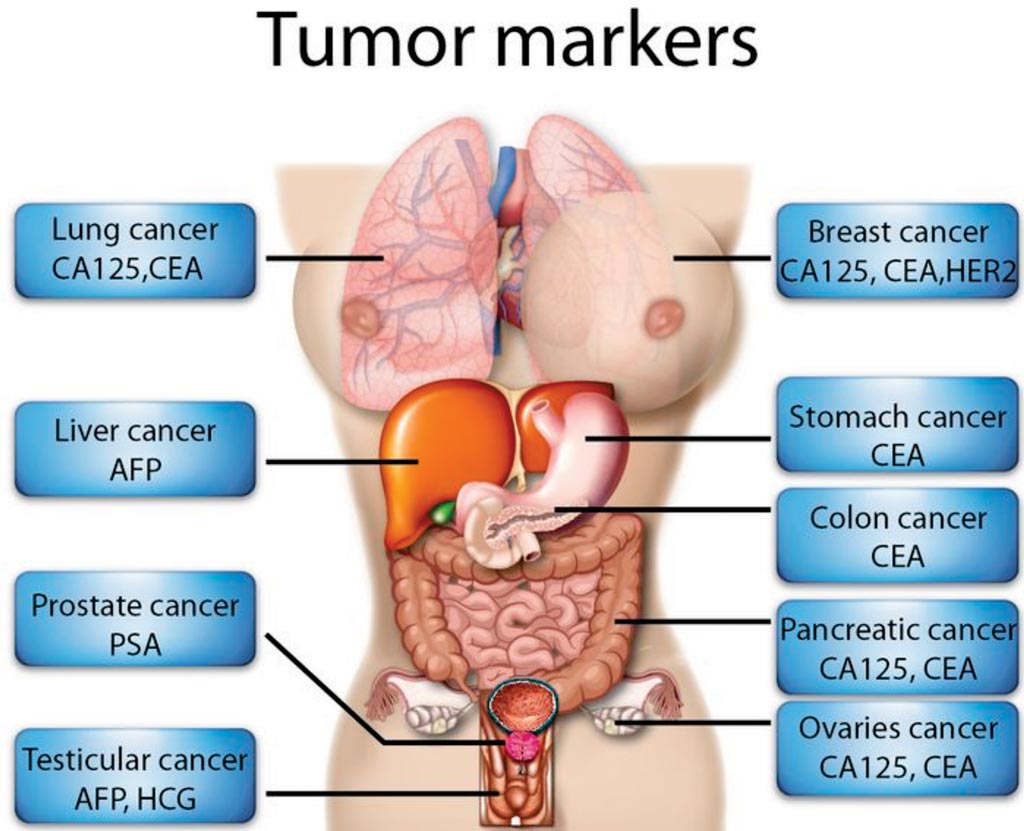Tumor Marker Tests Overused in Primary and Secondary Care
By LabMedica International staff writers
Posted on 15 Sep 2017
A tumor marker is a biomarker found in blood, urine, or body tissues that can be elevated by the presence of one or more types of cancer. The vast majority of tumor marker tests in primary and secondary care may not be necessary as the tests assisted with a cancer diagnosis in just 2% of patients.Posted on 15 Sep 2017
Tumor markers are molecules, which may be present in higher than usual concentrations in the tissue, serum or other body fluids of patients with cancer. There are many different tumor markers, each indicative of a particular disease process, and they are used in oncology to help detect the presence of cancer. A tumor marker can be used to aid diagnosis in specific situations but testing for more than one marker is not recommended.

Image: Common tumor markers used in the diagnosis of cancer (Photo courtesy of Health Education Library).
Scientists at South West Wales Cancer Centre (Cardiff, UK) examined the number of multiple tumor marker requests from primary and secondary care over a six-month period within Abertawe Bro Morgannwg University Health Board (Bagain, Neath Port Talbot, Wales). Multiple requests were defined as more than one tumors marker for a patient in a two-week period. The team looked at how many patients with multiple tumor markers measured were subsequently diagnosed with cancer, and whether the markers assisted with the diagnosis.
The investigators found there were 1,747 multiple tumor marker requests from both primary and secondary care. Of these, 297 patients (17%) eventually had a cancer diagnosis, but a tumor marker contributed to the diagnosis in just 35 patients (2%). Of the 985 multiple tumor marker requests in primary care, cancer was subsequently diagnosed in 50 patients (5%), with the tumor marker being useful in five patients (0.5%). Of the 762 requests that originated from secondary care, cancer was subsequently diagnosed in 244 patients (32%) and the tumor marker contributed to the diagnosis in 30 patients (4%). When extrapolated over a 12 month period the unnecessary tests cost just over GBP 95,000.
Craig Barrington, MD, an acute oncology registrar and lead author of the study, said, “Inappropriate use of tumor markers for diagnosis can cause anxiety, lead to unneeded tests, delay the correct diagnosis and increase costs. Most of the requests for multiple tumor markers did not lead to a cancer diagnosis and when patients were found to have cancer, in most cases the tumor markers did not contribute to the diagnosis.” The study was presented at the European Society for Medical Oncology Congress, held September 8-12, 2017, in Madrid, Spain.
Related Links:
South West Wales Cancer Centre
Abertawe Bro Morgannwg University Health Board














